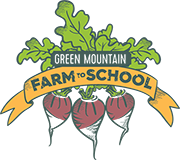In 2013, lunchtime at Irasburg Village School (IVS) looked a lot different than it does today. Uneaten food and kitchen scraps went straight into trash cans, then on to landfills.
The need for a composting program was apparent. But how to get there presented a challenge. At first, in the school started small – composting leftover snacks in small buckets each classroom maintained, then food service staff began composting scraps from preparing each meal.
In December 2017, the school conducted a “Waste Audit’. “It was ‘glaring’ how much compostable material was being thrown away, headed to the dump” explains Lindsey Davis, the middle school science teacher at IVS, “This data was presented to the school community during their weekly all-school meeting, and the results motivated the students to take action.”
The Sustainability Club took the lead, teaching students how to collect and organize food scraps. That following March, the Club presented their findings to the school board and were met with support both from the board and the food service staff – Jane and Karen.
That year, AmeriCorps Farm to School Coordinator, Hayly Hoch, saw the need for repeating education year after year so students are reminded and stay motivated throughout their educational careers. With that in mind, she conducted individual workshops with classes, discussed the importance of sorting and recycling food scraps. With 5th graders she taught soil science, while 6th graders learned about decomposition ecology, 7th graders went on a field trip to the Northeast Kingdom Waste Management District, and the Sustainability Club continued their discussions.
It is important that schools have composting programs because it teaches students about sustainability, natural earth processes, and how energy can be recycled in many forms – composting is one way we recycle and make use of what we already have. Composting also presents the opportunity for students to participate in hands-on learning and can help change their perception that they can make difference. “Our hope is that they take these lessons home and change slowly grows in Irasburg”, explains Davis.
Large-scale composting programs still have their challenges – keeping composting buckets tidy so students and teachers want to participate is essential. But the students at Irasburg are dedicated and have embedded composting into their routines – sharing the responsibility so no one person has to manage the entire program. Even the Principal takes part, noting that the trash bags are much lighter than they use to be.
When asked what tips they have for other schools looking to start composting programs, the teachers at IVS offer this: Even though it takes a while for students to catch on, you can build it into the culture within a year – after a year, it won’t feel like extra work. By having bins in classrooms, every student gets involved in a piece of the process – this way it doesn’t only weigh on one class or grade.








